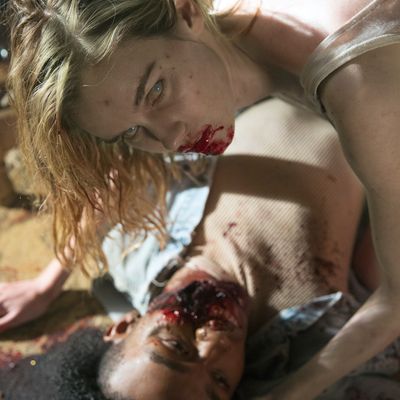
Every now and then, IÔÇÖll trot out that hacky TV-critic line about how a certain show is perfect to half-watch while youÔÇÖre folding laundry. I got vivid confirmation of why this clich├® was a clich├® last year, when the washing machine in my building sprang a leak and I had to drag my clothes to the local laundromat on a Sunday night with my two kids in tow. The TVs in the place were all tuned to The Walking Dead. The audience was a mix of Hispanics and whites with a smattering of Asians,┬áranging in age from late 20s to mid-60s. There were a couple of young families, one of which had toddlers. Every pair of eyes was on The Walking Dead. The audience wasnÔÇÖt cheering in bloodlust or recoiling in shock. Much laundry was folded. At one point, a walker was gutted practically from head to toe, and a woman at a nearby table glanced at the savagery, finished folding the comforter she was working on, and then refreshed her cell phone.
The prequel Fear the Walking Dead, which premiered Sunday night on AMC, will be a huge hit at laundromats across North America, IÔÇÖve no doubt.
The first two episodes hit a baseline of ÔÇ£pretty goodÔÇØ while serving up a couple of solid jolts and some memorable performance moments. And thatÔÇÖs about it. Despite superb photography and editing, a touch of John Carpenter in the pacing and scoring, and solid lead performances, this Los AngelesÔÇôbased prequel to AMCÔÇÖs long-running smash doesnÔÇÖt hit any┬áoriginal notes; it just strikes the old ones again, in a different register. ItÔÇÖs deliberately slow, drawing out what would be the first five minutes of other zombie films and stretching it over the course of a season, or two seasons, or however long this show ends up running, until civilization is in tatters and the world looks more or less like the one we saw when Rick Grimes woke up from his coma in the pilot of the original Walking Dead.
This sounds like faint praise, but I guarantee you AMC is reading this and thinking, Yes! We nailed it. This series exists so that AMC could have at least one guaranteed hit on the air during weeks when no new episodes of The Walking Dead were available. And ÔÇ£pretty goodÔÇØ was, of course, the baseline for the original Walking Dead┬áÔÇö a show that, for long stretches, has essentially been a 1980s-quality nighttime soap with postapocalyptic set design and bursts of TV-MA gore. It was excellent just often enough, and dreadful almost equally often enough, that the critical consensus evoked descriptions of a relative whoÔÇÖs delightful when heÔÇÖs not drinking. No, seriously, I know you and Uncle Earl had some issues, but heÔÇÖs in a great place right now, I promise. IÔÇÖve no doubt that four or five years from now, some critic will write a piece entreating people to watch Fear the Walking Dead because itÔÇÖs finally figured itself out, and itÔÇÖs pretty good again, you guys! If the prequel were amazing, it would be catastrophically off-brand. Fans wouldnÔÇÖt know what to make of it.
The pilot, co-written by series co-creators Robert Kirkman and Dave Erickson, opens with a young drug addict named Nick (Frank Dillane) landing in a hospital after witnessing some, shall we say, uncharacteristic behavior in a drug den. His mother, Madison (Kim Dickens), her live-in boyfriend,┬áTravis (Cliff Curtis), and sister, Alicia (Alycia Debnam-Carey), visit him the in hospital. Around the same time, a mysterious, flulike illness thins the ranks at AliciaÔÇÖs school. It seems that people all over the city are staying home sick. Is it possible that itÔÇÖs not just the flu? Could it be ÔǪ zombie-itis? (Flurry of violins.)
Dickens, whoÔÇÖs been a top-tier character actress ever since her searing work in ShowtimeÔÇÖs Things Behind the Sun 15 years ago, is unsurprisingly excellent here, and so is Curtis; they make the most of what are ultimately rather thin stoic roles: a good-hearted, loving couple coming to terms with a terrible situation. Dillane, the son of Game of ThronesÔÇÖ Stephen Dillane, has the most flamboyant role; Nick is a handsome, charming kid, but also a user, not just of drugs but of other people. The actor lets us see how this young man uses his charisma as inoculation against consequences; the actorÔÇÖs willingness to be irritating is much more daring than the showÔÇÖs violence or art-house slow-pacing. Frequent glimpses into NickÔÇÖs world make this series as much a drama about addiction as a science-fiction-horror melodrama. If the material were written with depth and insight ÔÇö as opposed to merely slowed to a glacial pace and photographed like a middling 1980s B-movie filmed on available L.A. streets ÔÇö this might constitute a mark of distinction. The show becomes slightly less monotonous when more characters show up and turn the series into, basically, Crash with flesh-eating ghouls; there are even moments that I almost want to call promising. But thatÔÇÖs not a hill I want to die on, because if IÔÇÖm wrong, I might be resurrected on a TV in a laundromat somewhere.


